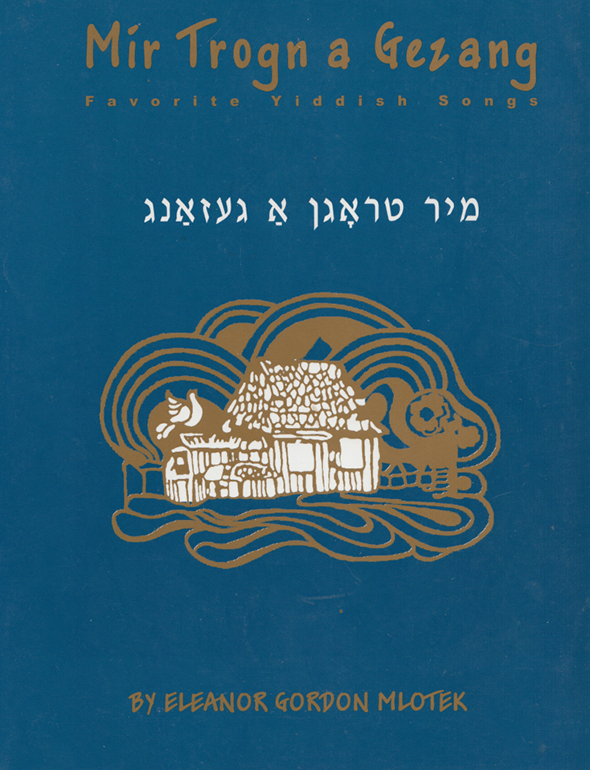Poem written in 1887 by Morris Rosenfeld (1862-1923), the poet of the sweat shop. This is one of the most popular songs about immigrant life in America. Morris Rosenfeld’s poems, which Upton Sinclair called “the genuine voice of the sweat shop workers,” (The Cry For Justice, 1915) were the first Yiddish poems to be translated into English and other languages.

I have a little boy, such a fine son! When I look at him, it seems to me that the whole world is mine. It’s seldom though that I see my boy awake, for I always find him sleeping and see him only at night. My job drives me from home at dawn and lets me return only late, so that I hardly know my own child’s looks.
My pale wife tells me how nicely the child plays, how sweetly he speaks, how cleverly he asks: Oh, Mama, when will dear Papa come and bring me a penny? I stand beside his little bed and hear him ask sleepily: “Oh where, oh where is my Papa?” I kiss the little blue eyes. They open, look at me and quickly close again. Depressed and embittered, I think to myself: One day, when you awake, my child, you will not find me anymore.
lkh hob a kleynem yingele,
A zunele gor fayn!
Ven ikh derze im, dakht zikh mir,
Di gantse velt iz mayn.
Nor zeltn, zeltn ze ikh im,
Mayn sheynem, ven er vakht,
lkh tref im imer shlofndik,
lkh ze im nor bay nakht.
Di arbet traybt mikh fri aroys,
Un lozt mikh shpet tsurik;
O, fremd iz mir mayn eygn layb,
O, fremd mayn kinds a blik!
lkh kum tseklemterheyt aheym,
In fintsternish gehilt —
Mayn bleykhe froy dertseylt mir bald,
Vi fayn dos kind zikh shpilt.
Vi zis es redt, vi klug es fregt:
— O mame, gute ma,
Ven kumt un brengt a peni mir,
Mayn guter, guter pa?
lkh shtey bay zayn gelegerl
Un ze, un her, un sha!
A troym bavegt di lipelekh:
— O, vu iz, vu iz pa?
lkh kush di bloye eygelekh;
Zey efenen zikh — o, kind!
Zey zeen mikh, zey zeen mikh
Un shlisn zikh geshvind.
Ikh blayb tseveytogt un tseklemt,
Farbitert un ikh kler:
Ven du dervakhst a mol, mayn kind,
Gefinstu mikh nit mer…
איך האָב אַ קלײנעם ייִנגעלע,
אַ זונעלע גאַר פֿײַן!
װען איך דערזע אים, דאַכט זיך מיר,
די גאַנצע װעלט איז מײַן.
נאָר זעלטן, זעלטן זע איך אים,
מײַן שײנעם, װען ער װאַכט,
איך טרעף אים אימער שלאָפֿנדיק,
איך זע אים נאָר בײַ נאַכט.
די אַרבעט טרײַבט מיך פֿרי אַרױס,
און לאָזט מיך שפּעט צוריק;
אָ פֿרעמד איז מיר מײַן אײגן לײַב,
אָ פֿרעמד מײַן קינדס א בליק!
איך קום צעקלעמטערהײט אַהײם,
אין פֿינצטערניש געהילט —
מײַן בלײכע פֿרױ דערצײלט מיר באַלד,
װי פֿײַן דאָס קינד זיך שפּילט.
װי זיס עס רעדט, װי קלוג עס פֿרעגט:
— אַ מאַמע, גוטע מאַ,
װען קומט און ברענגט אַ פּעני מיר,
מײַן גוטער, גוטער פּאַ?
איך שטײ בײַ זײַן געלעגערל
און זע, און הער און שאַ!
אַ טרױם באַװענט די ליפּעלעך:
— אַ װוּ איז,װוּ איז פּאַ?
איך קוש די בלױע אײגעלעך;
זײ עפֿענען זיך — אַ, קינד!
זײ זעען מיך, זײ זעען מיך
און שליסן זיך געשװינד.
איך בלײַב צעװײטאָגט און צעקלעמט,
פֿאַרביטערט און איך קלער:
װען דו דערװאַכסט א מאָל, מײַן קינד,
געפֿינסטו מיך ניט מער. . .
Song Title: Mayn Yingele

First published in 1972, Mir Trogn A Gezang: Favorite Yiddish Songs was reprinted six more times (in 1977, 1982, 1985, 1987, 1988, 2000) due to popular demand. The songs in this anthology represent a sampling of beloved folk and well-known Yiddish songs, many of which are scattered in various song collections; some appear in very rare and inaccessible collections; and some were never before published. Folk songs comprise about a third of this volume and were selected mainly on the basis of popularity and sometimes for their historic significance. Needless to say, they are only representative of the vast, rich treasure of Yiddish folk material. The selection was made not only on the basis of personal preference, but in the knowledge they are favorites of many who sing these songs. Most of the songs represent the repertoire that was sung at Yiddish summer camps, May 1st demonstrations and at social gatherings. Many songs were introduced to American Jewry by Jewish immigrants who came to the United States after World War II, for whom these songs had been favorites in Poland and other East European communities destroyed by the Nazis.